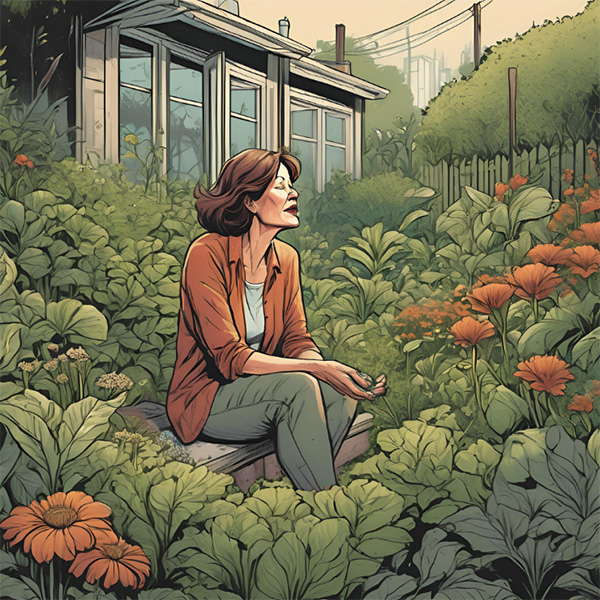Read by Matilda Longbottom

As we step outside onto the deck overlooking my garden, my mother’s voice echoes my father’s sentiment, though it’s she who verbalizes it this time.
“That climbing rose is happy,” she remarks, nodding towards the peach-flowering tangle atop the arbor. “Almost too happy.”
A pang of self-consciousness pricks me. Admittedly, a few thorny canes have sprawled into the nearby star magnolia tree, but in my parents’ lexicon, “almost too happy” translates to an overabundance. I feel silently judged.
My garden harbors other exuberant inhabitants: nasturtiums spilling out of pots, romping across the driveway, and pink hollyhocks soaring above the roofline, occasionally succumbing to gusty winds.
In contrast, my parents’ garden exudes monochromatic order and restraint. Black mondo grass edges gravel paths, while clumps of sculptural succulents punctuate neatly manicured borders.
But it wasn’t always this way. Childhood memories flicker like old home movies, painted in the saturated hues of orange dahlias and gold tiger lilies. Yet my parents’ tastes have evolved, simplified by age and aesthetics. They’ve traded high-maintenance blooms for low-effort foliage, though my father’s penchant for topiary remains.
My garden, however, now seems to vex them more, its untamed beauty a source of disquiet amid their cultivated calm.
As their car disappears around the corner, I wave goodbye amidst the riotous tapestry of aloe, fuchsias, and roses that envelops our home. A fence, crafted by my husband to corral the exuberance, stands sentinel, its slatted form an unintentional metaphor for containment.
But the fence cannot stifle the garden’s vitality. Ferns breach the barriers, while Cecile Brunner roses cascade over the top, trailing thorny fingers in playful defiance.
With my parents gone, I return to the backyard, past the raised vegetable beds basking in the sun’s embrace. Here, peppers and tomatoes thrive alongside woolly pink yarrow, nature’s unruly brushstrokes on cracked cement.
Today, however, my mother’s comment lingers, prompting a fleeting impulse to tame the rampant growth. I kick aside errant fennel and reach for the clippers, only to pause at the sight of a caterpillar clinging to a frond, a testament to the garden’s vibrant ecosystem.
Seated on the wooden stairs, I ponder my mother’s suggestion of twine to rein in the hollyhocks’ exuberance. But the idea of constraining their wild dance feels antithetical to their essence. Why should “happy” be synonymous with “wild” in my parents’ eyes? And what’s wrong with wild, anyway?
Perhaps our garden mirrors the tumult within our family—the slamming doors, the raised voices—a microcosm of controlled chaos. Even amidst the chaos, there’s joy, like my son’s whimsical embrace of Crazy Hair Day, immortalized against a backdrop of purple blooms.
But lately, the chaos has become less whimsical, more fraught. My parents would be aghast at the turmoil simmering beneath our roof, the unspoken tensions and resentments.
Beside me, the hollyhocks sway in the gathering breeze, a poignant reminder of life’s imperfections. Maybe I should buy that twine, impose some semblance of order. But for now, I’ll revel in the riotous beauty, a defiant celebration of life’s wild, untamed spirit.
For just a little longer, I’ll tilt my chin upward, tracing the hollyhocks’ graceful ascent against the canvas of the sky, and savor the fleeting perfection of this moment. ❖
About the Author: Simone Martel is an author and gardener based in Berkeley, California. Her work has been featured in publications such as Horticulture and Hip Mama, exploring the intersection of nature and human experience. With a passion for storytelling, Simone’s writing captures the intricacies of life’s messy beauty, finding solace amidst the chaos.


 Previous
Previous

